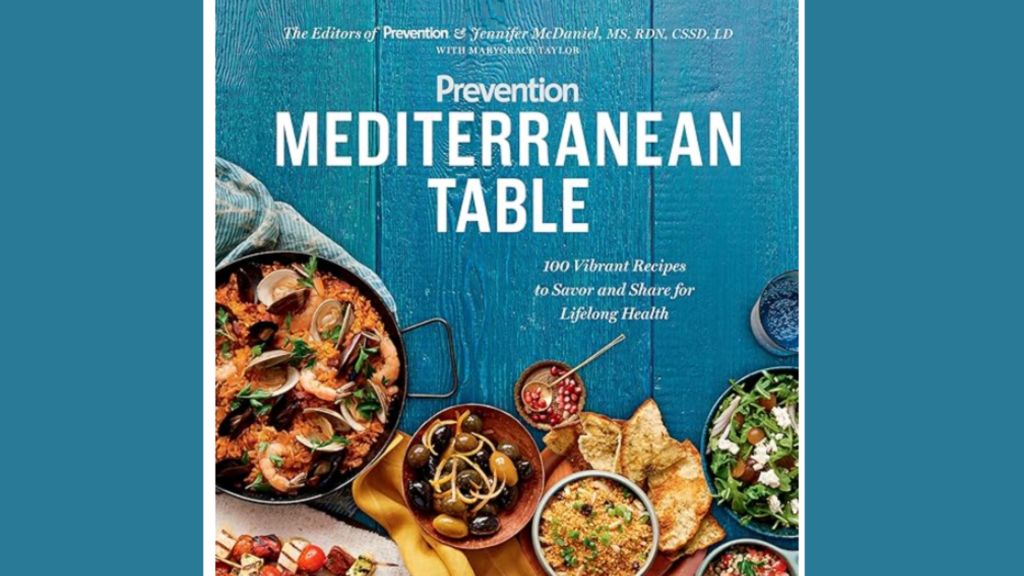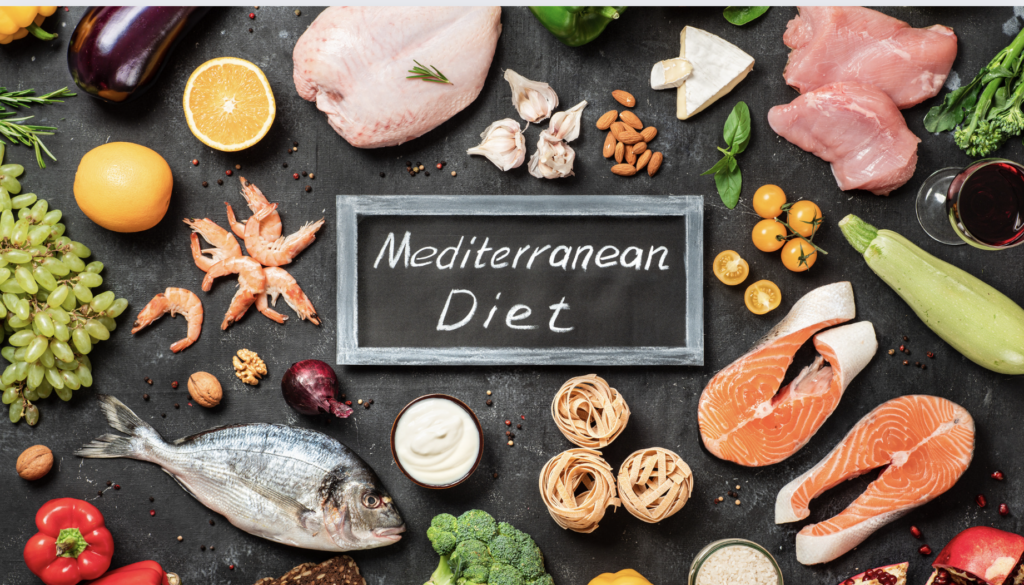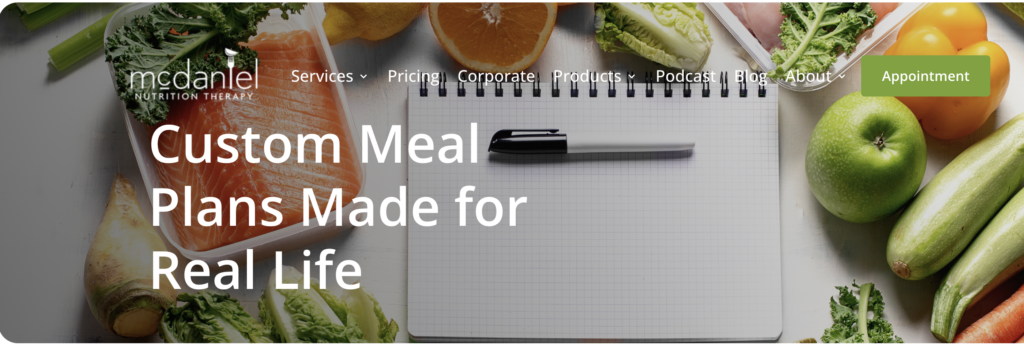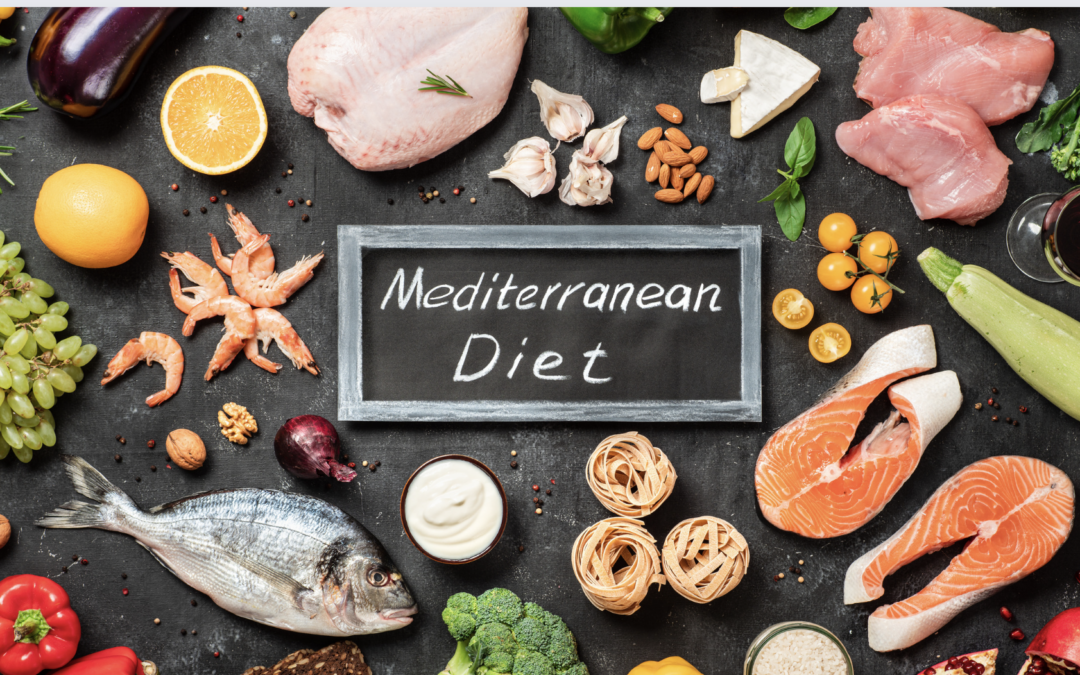The Mediterranean style of eating is close to our hearts at McDaniel Nutrition. Much of our nutrition recommendations are based on its dietary patterns. We’re such fans of this way of eating, we authored a cookbook on it! The Mediterranean (Med) Diet has robust research in both physical and mental health, and this post we dig into how it supports mental health plus 5 simple ways to enjoy the Med diet in your everyday eating patterns.

Mediterranean Patterns and Mental Health
You’ve likely heard of the Mediterranean “diet.” We prefer to say “style of eating” as the word “diet” does not often support mental health. Plus, this way of eating really does reflect a style or pattern of eating which includes:
- An emphasis on fruits, vegetables, whole grains, fish/seafood, beans/legumes, nuts, seeds, herbs/spices, avocado & olive oil
- Enjoying moderate amounts of poultry, eggs, dairy & yogurt
- Lower amounts of red meat, processed meat, added sugar and refined grains
- Movement, connection with others and eating at home

Of the dietary patterns, 3 major themes contribute to positive mental health outcomes:
- Polyphenols are natural plant compounds found in fruits and vegetables like grapes, apples, cocoa powder, soy foods, whole grains and nuts. These compounds protect our brain neurons, reduce brain inflammation and promote memory, learning and brain function.
- Essential fatty acids such as omega-3 fats found in fatty fish like salmon and tuna and monounsaturated fats found in foods like nuts, seeds and olive oils are vital for optimal brain function. They promote blood flow to the brain, provide structural support and optimize neurotransmitter function.
- Fiber-rich foods support the balance of beneficial gut bacteria. With a plant-centric approach, the Mediterranean diet is high in fiber. A robust, healthy microbiome is connected to positive mental health.
What Does the Research Say?
Some of the strongest evidence for the Med Diet and mental health is related to its ability to reduce the risk of depression. Evidence also shows its ability to reduce the risk of Alzheimer’s. You’ll get the most protection when you combine the Med diet with fish oils. Studies have also shown improvements in anxiety through dietary patterns of fiber-rich foods. Fiber-rich foods, especially prebiotics like onions, garlic, asparagus, green bananas, and potatoes are preferred fuel sources of gut bacteria. When digested, the bacteria produce short-chain fatty acids known to improve both gut health and consequently mental health.
How To Enjoy A Mediterranean Style of Eating

We’ll start with a shameless plug to check out our Custom Meal Planning Service! As authors of a Mediterranean Cookbook, we love helping our clients incorporate this style of eating into their everyday food patterns. Our dietitians map out EXACTLY what you need related to your personal health goals while educating you on meal planning and how to easily add these Med diet rich foods into breakfast, lunch, dinner and snacks. We take the mental meal planning load off your plate!
- Enjoy fruit as dessert. When you substitute fruit for cookies or candy, you reduce added sugars and ultra-processed foods. It likely takes time to retrain your taste buds to enjoy nature’s candy, but fruit can be a refreshing and filling way to end a meal.
- Include at least 2 servings of fatty fish/week. In our home, we call it “Salmon Sundays.” Overtime, even the kiddos in our home have grown to love this fatty fish. Tuna salad or these Zesty Lemon Tuna Cakes make for a delicious, simple lunch.
- Snack on nuts. A daily serving of nuts has been shown to support both brain and heart function. Nuts are the ideal, even-energy afternoon snack.
- Fill 1/2 your plate plants. We eat with our eyes. Aim to fill have your lunch and dinner plate with a variety of different vegetables.
- Go DIY when it comes to salad dressing. Salad dressings can often be filled with ingredients we get too much of in our diets, such as salt, sugar and soybean oil. A simple dressing is a splash of citrus (lemon or apple cider vinegar), olive oil, and a touch of honey, herbs and spices.
Our mental health is everything. It impacts how we engage with our world, and we are grateful in the power of food as means to shift this area of health in a positive direction. Please let us know if we can support you in our counseling or custom meal planning services.

